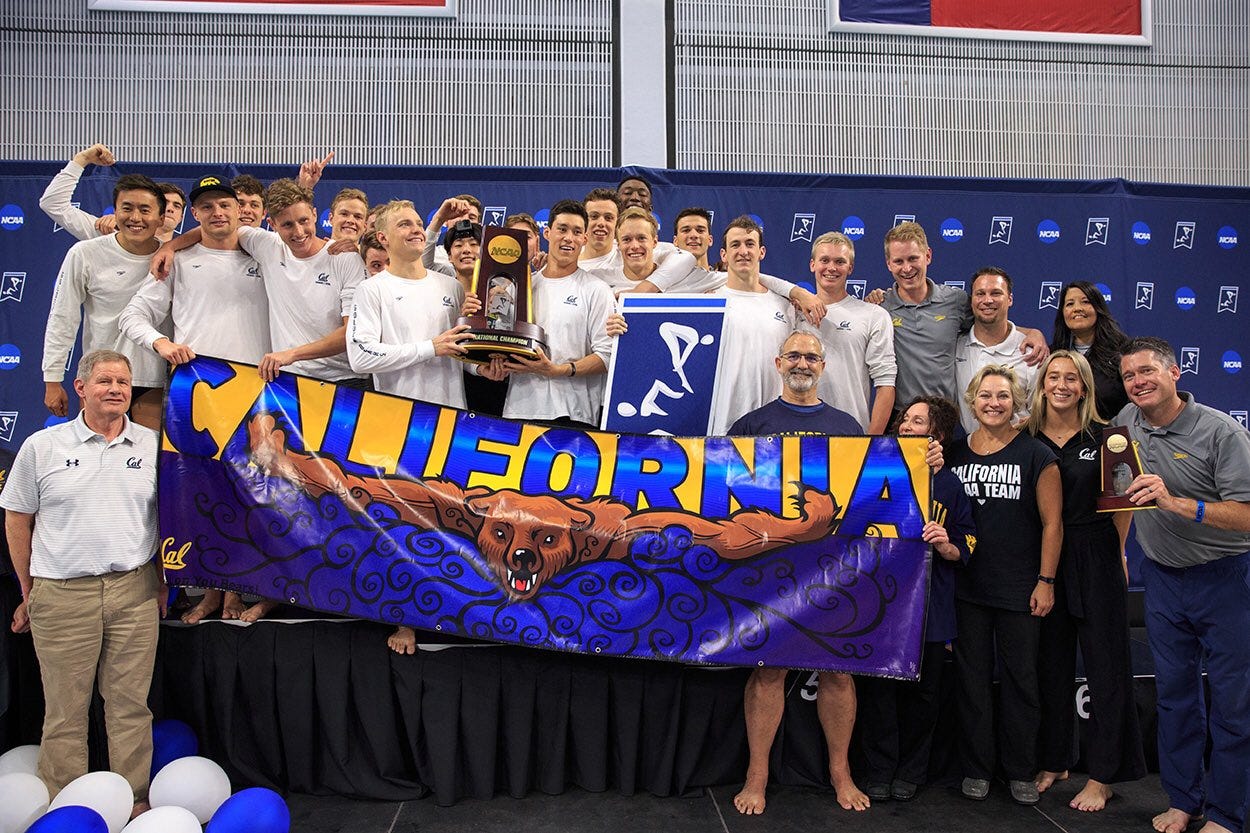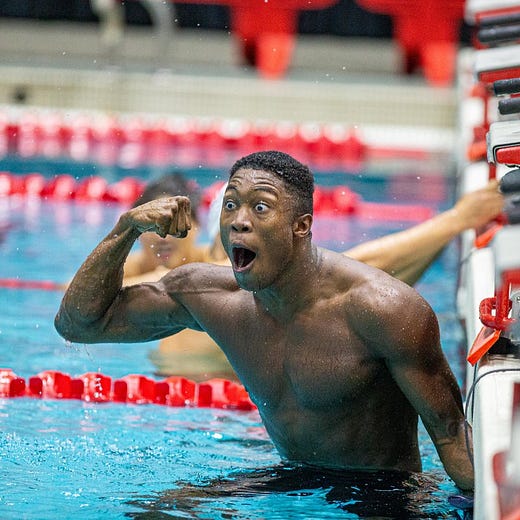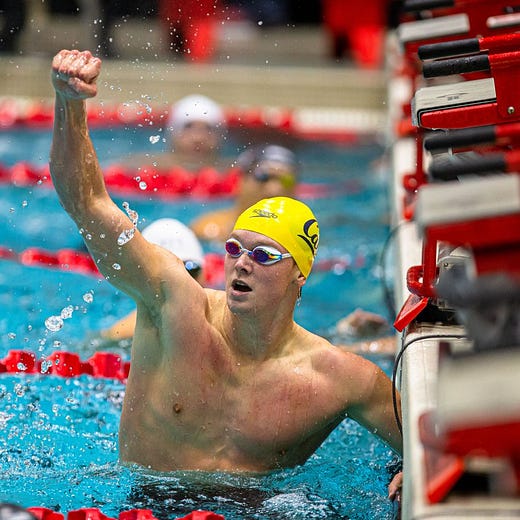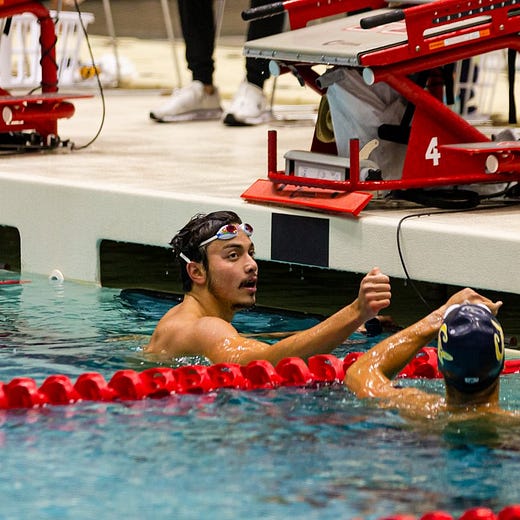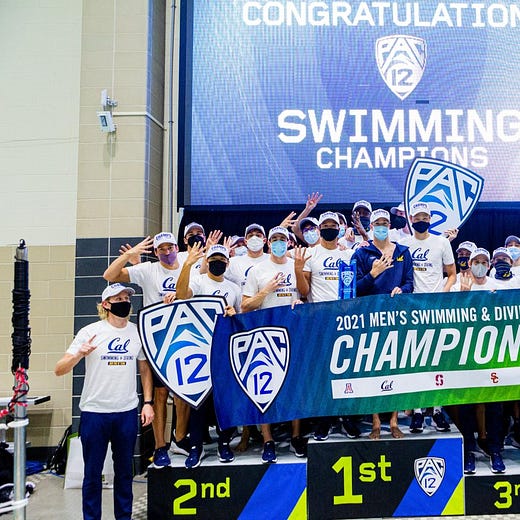Cal vs. Texas at NCAA Men's Swimming and Diving Championships, Part X
Cal (4) or Texas (5) have won 9 of the past 10 NCAA team titles (Michigan bested Cal for the 2013 title)
While the NCAA Women’s Swimming and Diving Championships did not turn out to be as great for the Cal Bears as I had hoped/expected, I will take another crack at previewing this week’s NCAA Men’s Swimming and Diving Championships with plenty of optimism.
With COVID-19 canceling the 2020 NCAA Championships, the California Golden Bears are still the defending champs. Unlike the women’s championships last week which had a lot of new contenders, the men’s championships will be yet another two-team race between Cal and Texas, with SEC foes Florida and Georgia likely battling for a distant 3rd place.
The Golden Bears have placed either first or second since 2010, earning 4 team national championships during that span and 6 runner-ups to Texas (5) and Michigan (1). That streak is expected to be extended for another year.
The women’s championships last week showed us that we might not get the typical time taper of a normal year due to the various changes in both training schedule and routines/methods this past year. For the Cal men, they did not do the typical Colorado Springs high-altitude training over the Winter Break this year. They always post a team picture in early January that makes you feel somewhat bad about all the holiday foods that you consumed in your winter break.
Nonetheless, with the help of improved hydrodynamic from the simple act of shaving, I do expect a much higher percentage of the men, compared to the women last week, to post their season-bests at this meet. Peaking at the right time (for these short-course yardage, SCY, swims) should be a given for both Cal and Texas and their experienced squads. I just might not expect as many personal, US, and/or NCAA records to be broken as a typical Olympic year.
The schedule is exactly the same as a week ago for their female counterpart. Just like last week, all of the relays will be turned into timed trials to minimize the number of swimmers on the deck during races. There will be no morning prelim relay swims necessary and thus less likelihood for a team to make a disqualification mistake. All of the prelims and finals sessions will be streamed by ESPN3, with a TV broadcast on ESPNU at some point in mid-April. You can find the live results here.
Schedule of Events (Time in PT)
March 24 — 3 p.m. finals
800-yard Freestyle Relay
March 25 — 7 a.m. trials | 3 p.m. finals
200-yard Freestyle Relay
500-yard Freestyle
200-yard Individual Medley
50-yard Freestyle
400-yard Medley Relay
One-meter Diving
March 26— 7 a.m. trials | 3 p.m. finals
400-yard Individual Medley
100-yard Butterfly
200-yard Freestyle
100-yard Breaststroke
100-yard Backstroke
Three-meter Diving
200-yard Medley Relay
March 27 — 7 a.m. trials | 3 p.m. finals
1,650-yard Freestyle
200-yard Backstroke
100-yard Freestyle
200-yard Breaststroke
200-yard Butterfly
Platform Diving
400-yard Freestyle Relay
Cal Bears at the NCAA
After dominating at the Pac-12 Championships a few weeks ago, winning 17 of 18 swimming events en route to a 4th consecutive Pac-12 team title (which was also held in 2020 before everything stopped), the Golden Bears will send 16 swimmers to this meet in Greensboro, NC. Other than the one relay-only swimmer, each Cal Bear can race in 3 individual events as well as 4 of 5 relays. The goal for every prelim session is to place as many Cal swimmers as possible into “scoring position” — top-16 in an event to score points, but preferably top-8 to make the A-Finals. The 5 relays events count as double points compared to the individual events.
If you have followed Cal men’s swimming for the past few years, most of these Cal Bears should be very familiar names. The main events and the extra events that these guys will race in are listed.
Freshmen
Destin Lasco – 100y back, 200y back, 200y IM
Tyler Kopp – 400y IM, 1650y free, 500y free
Dare Rose – 200y fly, 500y free, 100y fly
Björn Seeliger – 50y free, 200y free, 100y free
Sophomores
Colby Mefford – 200y free, 200y back, 500y free
Sebastian Somerset – 200y back, 100y back
Juniors
Hugo González – 200y IM, 400y IM, 200y breast
Chris Jhong – 400y IM, 200y IM
Reece Whitley – 100y breast, 200y breast, 200y IM
Seniors
Daniel Carr – 200y IM, 100y back, 200y back
Sean Grieshop – 500y free, 400y IM, 1650y free
Ryan Hoffer – 50y free, 100y fly, 100y free
Trenton Julian – 500y free, 200y free, 200y fly
Bryce Mefford – 200y IM, 100y back, 200y back
Zach Yeadon – 500y free, 1650y free, 200y free
The relay-only swimmer for the Cal Bears is senior Nate Biondi, son of Cal and USA Olympic legend Matt Biondi. Biondi is a regular on Cal’s 200y Free Relay.
Returning major contributors for the Golden Bears from two years ago are junior Reece Whitley and the incredible class of seniors1: Daniel Carr, Sean Grieshop, Ryan Hoffer, Trenton Julian, and Bryce Mefford. This group is as successful as any Cal class in any sports; they have already won 4 straight Pac-12 titles and can secure their legacy with the 2nd NCAA team title in 3 chances. One of the top US breaststrokers right now, junior Reece Whitley has arguably the best chance among the Americans on this Cal team to make the US Olympic Team this summer.
Spanish Olympian Hugo Gonzalez, a transfer from Auburn two and a half years ago, was ruled ineligible for the 2019 NCAA meet. He is finally ready to show what he can do for the Bears on the NCAA stage after last year’s cancellation. Gonzalez had already qualified for the Tokyo Olympic Games. He also competed in the 2016 Rio Games where he finished 16th in 200m Back and 20th in 100m Back.
Distance swimmer Zach Yeadon, a transfer from Notre Dame, is a much-needed boost to Cal’s distance swimming lineup. Yeadon placed 4th in 1650y Free as a freshman and was a B-Finalist in both 500y Free and 1650y Free in 2019.
The sophomore class includes two good backstrokers in the younger Mefford brother, Colby and Sebastian Somerset. The two of them will hopefully allow Cal to dominate Saturday’s 200y Back where it is plausible for 5 Bears to make the A-Final.
Cal head coach Dave Durden, also the Team USA head coach for the men this winter for the Tokyo Games, continues to entice top swimming prospects to come to Berkeley. This year’s talented freshmen includes Destin Lasco - arguably Cal’s top backstroker already despite being a freshman, Dare Rose - currently most comfortable in the 200y Fly, sprinter Björn Seeliger who will anchor several relays, and endurance swimmer Tyler Kopp. This talented freshman class can only be rivaled nationally by the group that opted to go to Texas.
While it is easy to point to the freshman class as replacements for the since graduated production from two years ago, the steady development of the guys that have been in the program for several years will lead the Bears to potential glory. Trenton Julian has arguably been the guy who has developed the most. He went from just a 200y Fly specialist to be a very versatile 200y Free, 400y IM (which he won’t swim this week), and 500y Free threat. So Trenton Julian will be this year’s Andrew Seliskar, hopefully; maybe Dare Rose will be the next Trenton Julian. Björn Seeliger will hopefully fill part of the hole left by Pawel Sendyk and Michael Jensen, particularly for those double-point relays. Lasco could be the next Daniel Carr or Bryce Mefford, if not the next Ryan Murphy who was the only man in history to sweep both backstroke races for all four years in college.
Given their experience, almost all of the upper-classmen should be near-lock to score (and hopefully be A-Finalists) in two or three events. Including the freshman Lasco for the two backstroke events, that is 9 Bears that can be double or triple A-Finalists (Hoffer, Julian, B. Mefford, Grieshop, Whitley, Lasco, Carr, Gonzalez, Yeadon). I also would not be too worried about the first-time National Championship attendees in the Cal travel group, given the wealth of knowledge on the team.
Cal vs. Texas X, AKA Fast 102
While the Cal Bears will have 16 swimmers, 15 guys in 43 total (24 seeded in the top-16) individual events plus a relay-only swimmer, the Texas Longhorns will counter with their own 16 swimmers in 46 events (25 seeded in the top-16) as well as 4 divers.
Below are the Cal Bears seeded in the top-16:
50y free: Hoffer (2nd, 18.81); Seeliger (3rd, 18.84)
100y free: Hoffer (2nd, 41.57);
200y free: Julian (8th, 1:32.29)
500y free: Julian (4th, 4:09.49); Yeadon (5th, 4:10.61)
1650y free: Yeadon (4th, 14:33.69)
100y back: Lasco (11th, 45.21); Carr (14th, 45.35); B. Mefford (15th, 45.38)
200y back: Lasco (2nd, 1:38.13); Carr (3rd, 1:38.81); B. Mefford (4th, 1:39.85); C. Mefford (10th, 1:40.50); Somerset (11th, 1:40.62)
100y breast: Whitley (8th, 51.38)
200y breast: Whitley (1st, 1:48.53)
100y fly: Hoffer (9th, 45.22)
200y fly: Julian (1st, 1:38.53); Rose (13th, 1:42.13)
200y IM: González (2nd, 1:41.05); Carr (9th, 1:42.34)
400y IM: González (2nd, 3:37.31); Grieshop (9th, 3:41.30)
You can almost assume that the Cal Bears have several more scores than those listed above. For example, Sean Grieshop finished 2nd in 400y IM as well as 2nd in 500y Free and 4th in 1650y Free just two years ago.
The Golden Bears are capable of winning the majority of the swimming events at this meet, even if Texas holds a few slightly better seed times in some of them.
Let’s look at the list above again but with Texas’ seed times included,
50y free:
Cal: Hoffer (2nd, 18.81); Seeliger (3rd, 18.84)
Texas: Krueger (10th, 19.10)
100y free:
Cal: Hoffer (2nd, 41.57)
Texas: Krueger (1st, 41.33); Kiebler (6th, 41.92); Staka (15th, 42.36)
200y free:
Cal: Julian (8th, 1:32.29)
Texas: Kiebler (2nd, 1:30.57); Larson (14th, 1:32.89); Sannem (15th, 1:32.98)
500y free:
Cal: Julian (4th, 4:09.49); Yeadon (5th, 4:10.61)
Texas: Kiebler (3rd, 4:08.26)
1650y free:
Cal: Yeadon (4th, 14:33.69)
Texas: Johnston (7th, 14:41.46); Zettle (12th, 14:45.56)
100y back:
Cal: Lasco (11th, 45.21); Carr (14th, 45.35); B. Mefford (15th, 45.38)
Texas: Jiang (7th, 45.09); Staka (8th, 45.12)
200y back:
Cal: Lasco (2nd, 1:38.13); Carr (3rd, 1:38.81); B. Mefford (4th, 1:39.85); C. Mefford (10th, 1:40.50); Somerset (11th, 1:40.62)
Texas: C. Foster (7th, 1:40.34); Katz (14th, 1:40.83)
100y breast:
Cal: Whitley (8th, 51.38)
Texas: Corbeau (13th, 51.62)
200y breast:
Cal: Whitley (1st, 1:48.53)
Texas: Corbeau (7th, 1:52.52)
100y fly:
Cal: Hoffer (9th, 45.22)
Texas: Jiang (5th, 44.91)
200y fly:
Cal: Julian (1st, 1:38.53); Rose (13th, 1:42.13)
Texas: Pomajevich (3rd, 1:39.19); Jiang (11th, 1:41.60)
200y IM:
Cal: González (2nd, 1:41.05); Carr (9th, 1:42.34)
Texas: C. Foster (4th, 1:41.46); J. Foster (10th, 1:42.59); Vine (13th, 1:43.18)
400y IM:
Cal: González (2nd, 3:37.31); Grieshop (9th, 3:41.30)
Texas: C. Foster (1st, 3:35.27); J. Foster (5th, 3:40.35); Vine (12th, 3:42.57)
The Texas Longhorns certainly can match the Cal Bears in terms of depth in most events. They easily repeated as the Big 12 conference champs for the 25th straight year (AKA every year that the Big 12 conference existed for swimming).
The two sides are fairly evenly matched in the breaststroke (with the edge to Cal for having Whitley), butterfly (advantage to Cal for having Julian as the top-seed), and the IM. Including the expected points from Grieshop in 500y Free and 1650y Free, I am inclined to give Cal the edge in the distance events after adding Yeadon this past offseason. The Bears certainly have more backstroke (Cal is Backstroke U, after all), but the Longhorns balance that by having slightly more freestyle depth. That freestyle advantage does translate to having the higher seed in relays, although the Golden Bears have arguably more versatility on their roster that they can count on strong freestyle relay legs from guys who do not race in the standard 100y Free and 200y Free events.
Relays
800y Free: Texas (1st, 6:07.34) vs. Cal (3rd, 6:11.98)
200y Free: Texas (2nd, 1:15.76) vs. Cal (3rd, 1:15.80)
400y Medley: Texas (1st, 3:02.11) vs. Cal (3rd, 3:02.60)
200y Medley: Cal (3rd, 1:22.74) vs. Texas (5th, 1:23.21)
400y Free: Texas (4th, 2:48.48) vs. Cal (5th, 2.48.66)
As you can see, Cal and Texas are fairly evenly matched in the relays as well. With the exception of a potential Texas dominance in the meet-opening 800y Free relay, either side is capable of finishing higher, if not winning, any of the other relays. Because of the time-trial nature of this year’s championships, I should note that Cal and Texas will be in different heats for the 200y Medley and 400y Free relays. Will that make a difference, especially with the team championship potentially being on the line in that final event?
For Texas’ No.1 ranked recruiting class, Carson Foster and David Johnston are already making big impacts. Carson Foster, the No.1 overall recruit of the last class, followed his older brother Jake to Texas and both are great in the IM events. Coby Carrozza will also race in 3 events, but that still does not quite match Cal’s 4 impact freshmen in this meet. Of course, Texas’ class ranking also included having two divers.
How much of an edge is diving for Texas?
After the graduation of Connor Callahan last year, who made the 2019 NCAA but did not score, Cal added Cal Poly transfer sophomore Tyler Wesson, who qualified for the canceled 2020 NCAA. Wesson did not qualify for the NCAA this year.
While Texas has qualified four divers who will compete in 12 events, only senior Jordan Windle is experienced at the NCAA. Windle won platform and placed 4th in 1-meter and 7th in 3-meter at the 2019 NCAA after 2nd on the platform, 5th in 1-meter, 5th in 3-meter finishes at the 2018 NCAA. He is joined by freshman Noah Duperre, sophomore Andrew Harness, and freshman Brendan McCourt.
Unfortunately for the Cal Bears, Windle alone will score 50+ points and the other guys may make a consolation final here or there to add a few more points. I would estimate a Texas diving edge of 60-65 points in the team score.
Scoring the psych sheet gives Cal a 449 to 428 edge to Texas. Of course, when you factor in Texas’ diving, the Golden Bears will need to beat their psych sheet score by 40 points. That is well within the uncertainty of how both teams will likely outperform the seed rankings.
There are plenty of Cal Bears who are capable of winning events to earn the bonus points. I also expect both Cal and Texas to have guys who will end up with top-16 swims despite seed rankings in the 20-30ish. I do not dare to guess who will win, except to tell you to expect a very exciting team race that should go down to the wire, assuming neither team suffer a catastrophic relay DQ nor the rarer but still common IM DQ for illegal strokes/turns.
Several major head-to-head showdowns might decide this team championship. While Texas may have the edge on Wednesday in the 800y free relay, Cal can bounce back with their better chances at event victories on Thursday (Hugo Gonzalez in 200y IM, Ryan Hoffer in 50y Free). The ultimate deciders on Thursday may come down to who wins/places higher in the two relays.
The pivotal Friday finals will open with the anticipated 400y IM showdown between Cal’s Hugo Gonzalez and Texas’ Carson Foster, as well as the 100y Fly race between two seniors in Cal’s Ryan Hoffer and Texas’ Alvin Jiang. Texas could make a big move in 200y Free on Friday, but the Cal Bears may answer that with the 200y Back dominance on Saturday. Cal fans might even be watching diving on Saturday just to figure out how many points Windle will earn for the Longhorns. With all that said, I cannot wait to see our Golden Bears overcome their diving shortcomings with a synchronized team dive into the pool after winning a 7th NCAA team title, 5th one under Dave Durden, in program history.3
GO BEARS!
While the NCAA does offer a free year of eligibility to all winter sports student-athletes this year, I am not sure yet about the plans for Cal to retain any of the seniors to make another NCAA run next year.
The Fast and the Furious franchise is not really known for its creativity in naming the films. The tentative name for the 10th move is “Fast 10” and “Furious 11” for the 11th and final? installment.
I am actually not certain that this kind of team celebration is allowed this year due to COVID-19 protocols.


